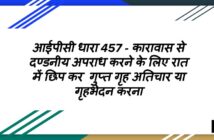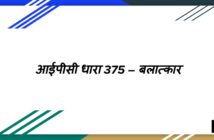Do you know that your mischief can take you to court? If the mischief results in loss or damage of amount of fifty rupees or more, then you will be liable for an offence under Section 427 of IPC. In this article, we will discuss Section 427 of IPC, its essential ingredients, nature, and punishment under Section 427 of IPC. To read in Hindi click here.
What is Section 427 IPC?
Suppose a person makes any mischief that causes loss or damage of an amount of fifty rupees or above. In that case, such person shall be liable under Section 427 of IPC.
Though the section states the damage amount of fifty rupees, which is a very minimal amount, this section is also applicable to the amount exceeding fifty rupees.
Example:
If a person knowingly throws another person’s cell phone into the water, intending to cause the loss of another person. Then such a person will be liable under Section 427 of IPC.
Essential ingredients of Section 427 IPC
To make a person guilty of an offence under Section 427 of IPC, there should be the following essential ingredients, namely;
- The person should do the act intentionally to cause damage to another person or;
- The person should know that their acts will cause damage or loss;
- The act committed should cause loss or damage to the person and
- The damage amount should be Rs. 50 or above.
What is mischief?
To understand this section, we should know the meaning of mischief.
Section 425 of IPC defines mischief. Suppose a person intentionally or knowingly causes damage or loss to another person. The damage should be such that it diminishes or degrades the property’s value or thing damaged. In that case, such a person is said to have committed mischief.
Suppose the property owner knows that a particular person will cause damage or loss to his property. In that case, such a person will be liable for mischief even if the damage has not been caused.
Example:
If X intentionally causes his cattle to enter into Y’s field. Here, X knows that the cattle will damage Y’s crop. Hence, X has committed mischief.
Is Section 427 IPC bailable and cognizable?
Section 427 of IPC is a bailable and non-cognizable offence that is compoundable at the discretion of the person whose property is damaged and is triable by any Magistrate.
Punishment under Section 427 IPC
Whoever commits an offence under Section 427 of IPC shall be punished with imprisonment of either description (simple or rigorous) for up to 2 years or with a fine or with both.
Md. Kausar Ali @Kaushar Ali Vs. The State of Jharkhand, 2020
In this case, the complainant purchased a property for valuable consideration and started cultivation on the said land. The accused, who did not have any right, title or possession of the land, started dumping iron ore, boulders, etc. on the portion of the said land due to which the land became infertile. Hence, the complainant was deprived of using the land for cultivation and suffered a loss of more than Rs. 10,000/-.
The court had held that all the ingredients of Section 427 and 447 of IPC are present in the present case. Therefore, the court had convicted the petitioner for the offence under Section 427 and 447 of IPC.
Conclusion
Any person who commits mischief and causes loss or damage to the property or valuable things of an amount exceeding Rs. Fifty then such person shall be liable under Section 427 of IPC. Under Section 427 of IPC, punishment is imprisonment for a term up to 2 years or with a fine or with both. It is a bailable, cognizable, and compoundable offence. Intention to cause damage or knowing that the act will cause damage or loss to another person is essential to making a person guilty of a crime under Section 427 of IPC. To read in Hindi click here.

